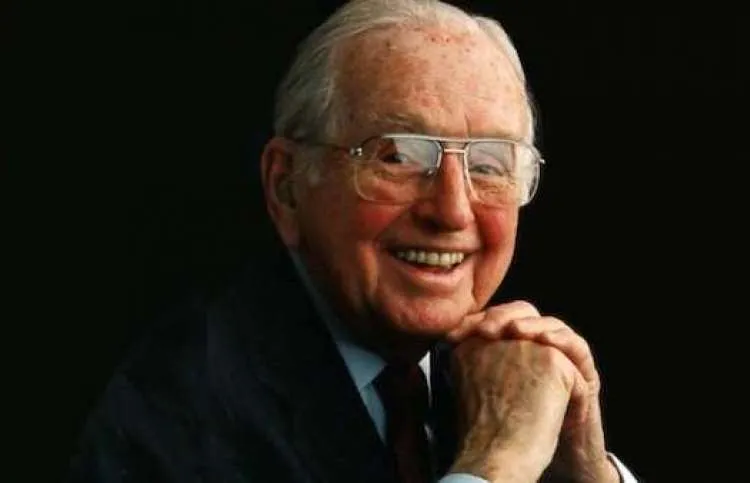I came to Guideposts in my twenties when our founder, Norman Vincent Peale, was well into his eighties. I remember a man of great charm and warmth, selfdeprecating wit and sweeping spirituality.
In those days, when he gave a speech or a sermon, you would see a short, white-haired, bespectacled man dodder up to the microphone, looking like “an oyster cracker,” in People magazine’s memorable phrase, and you might wonder what the fuss was about. How could this unassuming person have written one of the biggest-selling and most life-changing books of all time, The Power of Positive Thinking?
But the minute he opened his mouth, a remarkable transformation occurred. His voice crackled and boomed. The decades dropped away. He seemed to grow in size and stature. And he radiated confidence. Wow, you thought, I want to have what he has!
Through his words you could see how belief in God and in oneself can be transfiguring. You participated in it with him and found yourself changed. Not long ago I wanted to see if this was still true and recommended Peale’s writings to a thirty-something friend who was going through a rough patch.
“Try this,” I said, handing him a book. He gobbled it up and read more. In the process I saw the knitted brow unclench, the self-absorption lift, the laugh return. It was the kind of transformation that Peale himself underwent at about that same age when he was beset by self-doubt.
What was this power Dr. Peale had, two decades after his death? He would have been quick to tell you that it wasn’t his doing. It was God’s work. Anybody had access to that. In fact, in his 60-plus years of ministry, 52 years served at the same church, Marble Collegiate in New York—an astounding record—he was always stretching and growing.
I remember him coming by the office one day, after his retirement from regular preaching, to pick up a stack of demanding tomes: theologians like Martin Buber, philosophers like William James and a new translation of the Bible.
In his own writings there is a constant effort to show how belief has a practical effect on daily life. His advice is simple and direct.
Read a Bible verse like “Do not be anxious about anything, but in every situation, by prayer and petition, with thanksgiving, present your requests to God” (Philippians 4:6) and let it speak directly to your worries. Don’t let your dark thoughts or fears strangle you, but share them with someone else. Then let them go and trust God.
Peale was always quick to give examples. Sometimes he himself would be Exhibit A, or it might be someone he met on a plane, in his office, at a sales convention or simply in passing. His calling was to connect the dots between our faith and our everyday life. That’s what I remember most about Dr. Peale. He was a man of capacious prayer.
One of his greatest praying lessons was that if you concentrate on one verse of the Bible it can have a transformative effect, whether it is a line of a Psalm like “My flesh and my heart may fail, but God is the strength of my heart and my portion forever” or something from the Sermon on the Mount: “Let your light shine before others, that they may see your good deeds and glorify your Father in heaven.”
You pray it and own it, and the vocabulary of faith becomes second nature.
Of course, Peale had his dark moments when he struggled with low self-esteem, even after his success. His longtime associate, my friend Arthur Caliandro, told me about one summer when Peale seemed to plummet into an intractable funk.
The famous author of The Power of Positive Thinking depressed? Yes, and that’s part of the appeal of Peale. Nobody needed the inspiring words he wrote and spoke more than he did. That’s what gave him his compassion, understanding and humility.
He made no secret of his long struggle with an inferiority complex. With Peale you were always hearing from both the doctor and the patient.
With so much on his shoulders he still managed to be incredibly fun-loving. He reveled in making himself the butt of a joke. Watching some of his sermons or listening to them (go to guideposts.org/ppt for a new app to bring them to your mobile device) I can’t help but laugh along with his congregation.
I remember at his ninetieth birthday party, a celebrity-studded fundraiser at the Waldorf Astoria, he spoke, following many glowing tributes. Standing at the podium in black tie, peering at the crowd through his glasses, he quipped, “I’m nothing more than a gimmick in a tux.”
He had no use for pretense or affectation. Peale was Peale.
Maybe that’s what made it easier for him to drop everything when he saw a person in need. One sad afternoon he came by the Guideposts office when we’d just learned of the sudden death of an editor from a stroke. Her young assistant was devastated.
Dr. Peale sat down next to her, held her hand, bowed his head and prayed in the most remarkable, spontaneous, comforting way. I’ve often wished I had taped him, but now I think that wouldn’t have been necessary because the voice I heard was the one I hear in my head when I read his words.
He brought faith down from the clouds and into those day-to-day situations when you need it most.
Download your FREE ebook, A Prayer for Every Need, by Dr. Norman Vincent Peale







